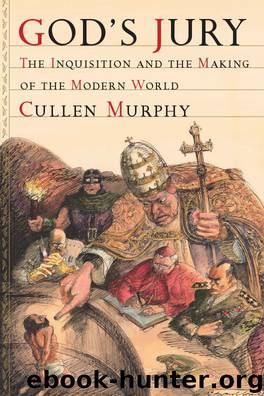God's Jury: The Inquisition and the Making of the Modern World by Murphy Cullen

Author:Murphy, Cullen [Murphy, Cullen]
Language: eng
Format: epub, mobi
Publisher: Houghton Mifflin Harcourt
Published: 2012-01-16T23:00:00+00:00
“Let’s Not Make a Jonah of Him”
The long, haunting ordeal of Pierre Teilhard de Chardin, one of the premier Catholic theologians of the twentieth century, began a little more than a decade after the advent of the oath. It would continue for thirty-five years, and although vindication of a sort did one day come, it did not come in his lifetime. Teilhard was born in France and in 1911 was ordained a Jesuit priest. The Jesuits have long been regarded as the intellectual elite among Catholic religious orders, and they are typically trained in academic specialties beyond theology. Rather than cloistering themselves away from the secular world, as contemplative orders do, they engage actively in that world. Among traditionalists, they have a reputation for skepticism, epitomized in George Tyrrell’s famous prayer: “O God, if there is a God, save my soul, if I have a soul.” Teilhard’s academic work was initially in geology and paleontology. He spent years on excavations in China, and was involved in the discovery and analysis of Peking Man. His lifelong immersion in paleontology informed his theological speculations about human origins and the future of human evolution. These were dangerous topics.
In the early 1920s, an essay on original sin that Teilhard had circulated privately came to the attention of the Holy Office. To this day, no one is quite sure how it did. Original sin refers to the doctrine that humanity exists in a fallen state—a condition represented by the transgression of Adam and Eve and the expulsion from the Garden of Eden. “There is a twofold and serious difficulty in retaining the former representation of original sin,” Teilhard wrote in 1922. “It may be expressed as follows: ‘The more we bring the past to life again by means of science, the less we can accommodate either Adam or the earthly paradise.’” Statements like this caused official consternation. Teilhard was summoned to Rome and asked to sign a statement that (in his words) he would “never say or write anything against the traditional position of the Church on original sin.”
In what was to become a pattern, he submitted obediently, though with frustration, and signed the statement. One factor in his decision was summarized in a letter: “I weighed up the enormous scandal and damage that an act of indiscipline on my part would have caused.” In another letter, Teilhard wrote, “Some people feel happy in the visible church; but for my own part I think I shall be happy to die in order to be free of it—and to find our Lord outside of it.” Several years later, Teilhard completed a book called The Divine Milieu, a work of spirituality that contemplated Christian belief in the context of evolutionary destiny. He circulated the manuscript privately, and then sought permission to publish. Permission was denied. The same fate befell virtually all his subsequent works, including his masterpiece, The Phenomenon of Man, which describes human evolution as a path toward greater complexity and collective consciousness. The Holy Office
Download
God's Jury: The Inquisition and the Making of the Modern World by Murphy Cullen.mobi
This site does not store any files on its server. We only index and link to content provided by other sites. Please contact the content providers to delete copyright contents if any and email us, we'll remove relevant links or contents immediately.
The Lost Art of Listening by Michael P. Nichols(7506)
Why I Am Not A Calvinist by Dr. Peter S. Ruckman(4153)
The Rosicrucians by Christopher McIntosh(3521)
Wicca: a guide for the solitary practitioner by Scott Cunningham(3179)
Signature in the Cell: DNA and the Evidence for Intelligent Design by Stephen C. Meyer(3138)
Real Sex by Lauren F. Winner(3023)
The Holy Spirit by Billy Graham(2953)
To Light a Sacred Flame by Silver RavenWolf(2823)
The End of Faith by Sam Harris(2742)
The Gnostic Gospels by Pagels Elaine(2531)
Waking Up by Sam Harris(2461)
Nine Parts of Desire by Geraldine Brooks(2369)
Jesus by Paul Johnson(2363)
Devil, The by Almond Philip C(2333)
The God delusion by Richard Dawkins(2309)
Heavens on Earth by Michael Shermer(2285)
Kundalini by Gopi Krishna(2185)
Chosen by God by R. C. Sproul(2165)
The Nature of Consciousness by Rupert Spira(2108)
